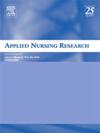导致护理遗漏的因素:对实践和患者安全的临床意义的系统回顾
IF 2.2
4区 医学
Q1 NURSING
引用次数: 0
摘要
目的护理缺失(MNC)越来越被认为是护理质量的一个指标,也是不良事件的潜在诱因。本系统综述旨在探讨MNC与公立和私立医院住院患者不良事件之间的相关性。方法根据PRISMA 2020指南进行系统评价。检索于2025年1月至2月在PubMed、Embase、CINAHL、Scopus和TripDatabase中进行。纳入的研究是定量的,以英语或意大利语发表,并专注于急性医院环境。采用乔安娜布里格斯研究所(JBI)检查表评估方法学质量;采用ROBINS-I评估偏倚风险。结果7项研究符合纳入标准,共纳入13619名护士和902名患者。研究设计包括四项横断面分析、两项观察分析(一项相关分析)和一项辅助数据分析。五项研究报告了MNC与不良事件之间的正相关,而两项研究发现了负相关或不显著的关系。常见的不良后果包括跌倒、感染、压疮和用药错误。尽管方法上存在异质性和局限性,如使用未经验证的工具或背景差异,但证据表明跨国公司与不良事件之间存在一致的关联。这些发现强调了作为患者安全问题解决错过护理的重要性。需要进一步的纵向研究来确认因果关系并为预测模型提供信息。对护理实践的启示认识到跨国公司与不良事件之间的联系应促使医疗保健组织通过人员配置优化、安全文化和临床治理来解决护理疏忽问题。有针对性的干预措施可以减少可预防的伤害并提高护理质量。本文章由计算机程序翻译,如有差异,请以英文原文为准。
Contributing factors to missed nursing care: A systematic review with clinical implications for practice and patient safety
Objectives
Missed Nursing Care (MNC) is increasingly recognized as an indicator of care quality and a potential contributor to adverse events. This systematic review aimed to explore the correlation between MNC and adverse events in hospitalized patients across public and private settings.
Methods
A systematic review was conducted according to PRISMA 2020 guidelines. Searches were performed in PubMed, Embase, CINAHL, Scopus, and TripDatabase between January and February 2025. Included studies were quantitative, published in English or Italian, and focused on acute hospital settings. Methodological quality was assessed using the Joanna Briggs Institute (JBI) checklist; risk of bias was evaluated with ROBINS-I.
Results
Seven studies met the inclusion criteria, involving 13,619 nurses and 902 patients. Study designs included four cross-sectional, two observational (one correlational), and one secondary data analysis. Five studies reported a positive association between MNC and adverse events, while two found inverse or non-significant relationships. Common adverse outcomes included falls, infections, pressure ulcers, and medication errors.
Conclusions
Despite methodological heterogeneity and limitations—such as the use of non-validated tools or contextual differences—the evidence suggests a consistent association between MNC and adverse events. These findings underscore the importance of addressing missed care as a patient safety concern. Further longitudinal studies are needed to confirm causality and inform predictive models.
Implications for nursing practice
Recognition of the link between MNC and adverse events should prompt healthcare organizations to address care omissions through staffing optimization, safety culture, and clinical governance. Targeted interventions may reduce preventable harm and improve care quality.
求助全文
通过发布文献求助,成功后即可免费获取论文全文。
去求助
来源期刊

Applied Nursing Research
医学-护理
CiteScore
4.50
自引率
0.00%
发文量
65
审稿时长
70 days
期刊介绍:
Applied Nursing Research presents original, peer-reviewed research findings clearly and directly for clinical applications in all nursing specialties. Regular features include "Ask the Experts," research briefs, clinical methods, book reviews, news and announcements, and an editorial section. Applied Nursing Research covers such areas as pain management, patient education, discharge planning, nursing diagnosis, job stress in nursing, nursing influence on length of hospital stay, and nurse/physician collaboration.
 求助内容:
求助内容: 应助结果提醒方式:
应助结果提醒方式:


